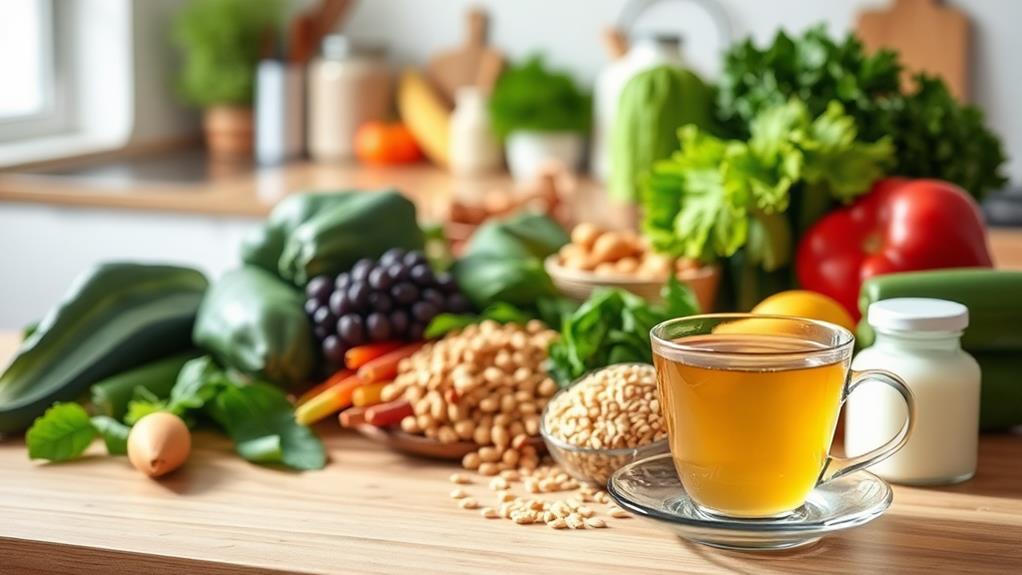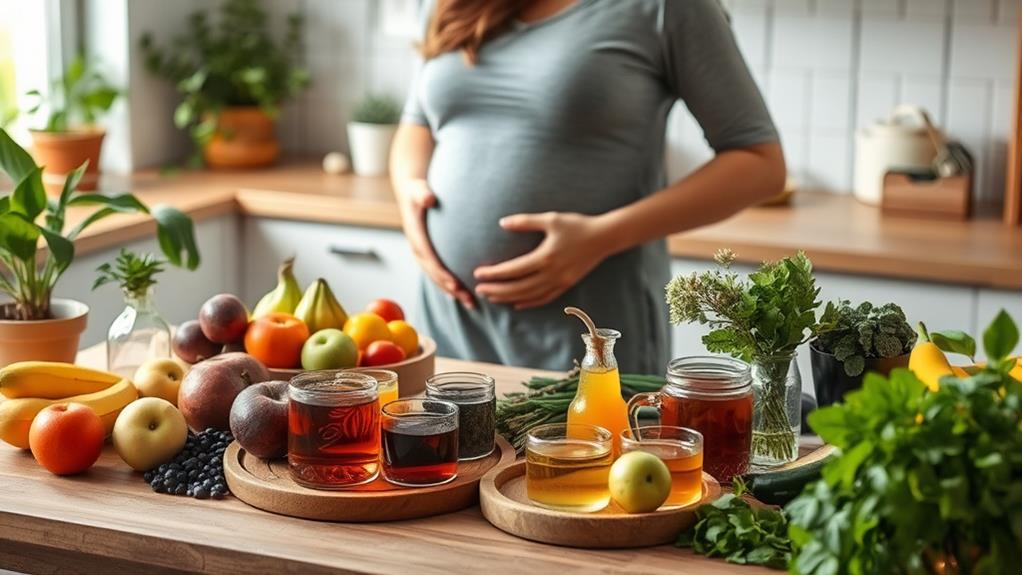If you're pregnant, you might find yourself grappling with gas and bloating more than usual, and it can be quite uncomfortable. This discomfort often stems from hormonal changes and the physical pressure of your growing uterus. You're probably wondering what you can do to ease this situation without resorting to medications. Thankfully, there are several home remedies and dietary adjustments that can help alleviate these symptoms. But what are the most effective strategies, and when should you consider reaching out for professional advice?
Understanding Pregnancy Gas

During pregnancy, understanding gas can be crucial for your comfort. As your body changes, you might notice increased gas and bloating. This is often caused by higher levels of the hormone progesterone, which relaxes your intestinal muscles. As a result, digestion slows down, leading to more gas buildup.
Plus, your growing uterus puts extra pressure on your intestines, making things even slower.
Some common dietary triggers can make this situation worse. If you eat a high-fiber diet, you might find that foods like beans, broccoli, or cauliflower can lead to more gas. And if you're lactose intolerant, dairy products can also cause trouble, leading to bloating and discomfort.
If you're feeling gassy, don't worry—there are home remedies! Simple dietary changes, like eating smaller meals or staying hydrated, can help.
Just remember to pay attention to your body. If you experience severe abdominal pain or big changes in your bowel habits, it's a good idea to chat with your doctor. Knowing what causes gas during pregnancy can make your journey a lot more comfortable!
Common Causes of Bloating
Experiencing bloating during pregnancy is quite common, and several factors contribute to this discomfort. One major cause is hormonal changes. When your body makes more progesterone, it relaxes your intestinal muscles, slowing digestion and causing gas to build up.
Plus, the physical pressure from your growing uterus can squish your intestines, making bloating worse.
Certain foods can also be culprits. You might notice that beans, cruciferous vegetables, and dairy products lead to increased bloating. These foods often contain high fiber or indigestible carbohydrates that your body finds tricky to process.
Don't forget about those sneaky habits! Swallowing air from chewing gum, gulping down your food, or sipping on carbonated drinks can add to the bloating and gas, too.
Another common issue during pregnancy is constipation. It slows down the movement in your intestines, allowing for more fermentation of your food.
This can lead to an even more uncomfortable abdominal feeling. So, if you're feeling a bit bloated, you're not alone! Understanding these causes can help you find relief and feel more comfortable.
Dietary Factors Contributing to Gas

Gas can really build up during pregnancy, and your diet plays a significant role in this discomfort. Certain dietary factors can contribute to gas and bloating, making you feel quite uncomfortable. High-fiber foods, like beans and cruciferous vegetables, are great for you but can also lead to more fermentation in your intestines, which means more gas.
Fruits high in fructose and sorbitol, like apples and pears, can also be troublemakers since they're poorly absorbed during digestion. If you're lactose intolerant, dairy products can be a sneaky source of gas. When lactose isn't digested properly, it gets fermented by bacteria in your colon, resulting in gas production.
And let's not forget about those fizzy carbonated beverages! They add carbon dioxide to your system, which can cause bloating and even more flatulence.
To tackle this, you might want to keep a food diary. This little tool can help you pinpoint which foods are triggering your gas, helping you manage your symptoms better.
Safe Home Remedies
Finding relief from gas and bloating during pregnancy can be challenging, but several safe home remedies can help ease discomfort.
First, you might want to sip on some herbal teas, like peppermint or ginger. They're known to help relieve gas pain and promote digestion.
Another simple trick is applying a warm compress to your belly. This can relax the muscles in your digestive tract and ease that bloated feeling.
Don't forget about exercise! Gentle activities, like walking or prenatal yoga, can stimulate digestion and reduce gas buildup. It's a great way to keep moving while also feeling better.
Plus, incorporating yogurt with probiotics into your diet can balance your gut bacteria. This may improve digestive health and reduce gas production.
Lastly, staying well-hydrated is key. Drinking about 8-10 glasses of water daily not only supports overall digestion but can also help prevent constipation, which can make gas symptoms worse.
So, take a moment to try these home remedies. You'll be on your way to feeling more comfortable in no time!
Importance of Hydration

During pregnancy, staying hydrated is crucial for your overall health and comfort. Drinking enough water—about 8-10 glasses a day—can work wonders for your digestive health. It helps prevent constipation, which can be a pesky pregnancy symptom.
When you're properly hydrated, it's easier for your body to break down and absorb nutrients, helping to alleviate symptoms of gas and bloating that many expectant moms experience.
Incorporating low-FODMAP juices, like cranberry or orange juice, can also contribute to your water intake while helping to reduce gas symptoms.
And don't forget about herbal teas! Peppermint and ginger teas aren't only soothing but can also be hydrating and relieve gas discomfort.
If you find yourself feeling bloated or gassy, remember that dehydration can make those issues worse. So, keep that water bottle close!
Staying hydrated is one of the best home remedies you can use during pregnancy. Plus, it's a simple way to feel a little better when those pregnancy symptoms start to creep in.
Cheers to hydration and feeling good!
Exercise and Physical Activity
Many expectant mothers discover that incorporating exercise into their daily routine can significantly ease discomfort from gas and bloating. Engaging in light physical activity, like walking for at least 30 minutes a day, is a great start. It helps improve digestion and can keep gas at bay.
Plus, low to moderate-intensity activities, such as prenatal yoga and gentle stretching, enhance your comfort and reduce those pesky digestive symptoms.
Physical activity is also fantastic for promoting bowel movements, which is super important since constipation can be a common contributor to gas during pregnancy. So, if you're feeling a bit blocked up, a little movement might just do the trick!
Don't forget about your posture while exercising. Good posture can create more abdominal space and reduce pressure on your intestines, making things feel a lot better.
Aim for at least 150 minutes of exercise each week to support your overall digestive health and manage gas-related discomfort. Remember, staying active doesn't have to mean hitting the gym hard; it can be as simple as a stroll around the block or some relaxing yoga.
Enjoy moving your body and feeling good!
Managing Dietary Triggers

Managing dietary triggers is crucial for relieving gas and bloating during pregnancy. One of the best ways to start is by keeping a food diary. It'll help you identify specific gas-triggering foods. You might want to watch out for beans, lentils, and cruciferous vegetables like broccoli and cauliflower.
And if you're lactose intolerant, dairy products could be your sneaky culprits too!
To keep that excessive gas buildup at bay, try gradually increasing your fiber intake. Adding high-fiber foods to your diet can be great, but do it slowly so your tummy can adjust.
Also, avoid carbonated beverages. Those fizzy drinks pack in carbon dioxide, which can turn your belly into a balloon!
Eating smaller, more frequent meals instead of large portions can also help. Think of it as giving your digestive system a little break.
It's like going on a date with your food—short and sweet! Remember, it's all about finding what works for you, so don't hesitate to experiment.
With a bit of patience and some smart choices, you'll be on your way to a happier, less bloated pregnancy!
When to Seek Medical Help
While dietary adjustments can help alleviate gas and bloating during pregnancy, there are times when it's important to seek medical help. If you experience severe abdominal pain lasting longer than 30 minutes, don't just brush it off. This could indicate a serious condition that needs attention.
Also, if you notice gas symptoms along with persistent nausea and vomiting, it's best to consult your healthcare provider, as these could signal complications.
Keep an eye out for any blood in your stool. If that happens, seek immediate medical attention—seriously, don't wait!
Chronic constipation that doesn't budge with home remedies could also require professional assessment, so don't hesitate to reach out if that's the case.
Lastly, if you notice any noticeable changes in your gas patterns or bowel habits lasting more than a few days, it's a good idea to check in with your healthcare provider.
Natural Remedies for Relief

Finding relief from gas and bloating during pregnancy can be achieved through several effective natural remedies. First, try sipping on herbal teas, like peppermint or ginger. These can work wonders for your digestion and help reduce those annoying intestinal spasms.
If you're feeling some gas pain, a warm compress on your belly can be soothing. It relaxes your muscles and improves blood flow, making you feel a lot better.
Don't forget about gentle exercises! Walking or doing some prenatal yoga can really boost your digestion and help move that gas along. Plus, it's a great way to get some fresh air!
Another helpful tip is to add yogurt with probiotics to your diet. It can balance your gut bacteria, which might cut down on gas production.
Lastly, hydration is key! Aim for 8-10 glasses of water each day. Staying well-hydrated can help prevent constipation, which is often a culprit in bloating.
Lifestyle Adjustments for Comfort
To enhance your comfort during pregnancy, consider making a few lifestyle adjustments alongside those natural remedies.
First off, regular light exercise, like walking or prenatal yoga, can work wonders. Aim for about 150 minutes a week to help with digestion and keep that pesky gas discomfort at bay.
Also, try eating smaller, more frequent meals instead of big ones. This'll lighten the digestive load and cut down on gas production.
Staying hydrated is super important too! Drinking 8-10 glasses of water daily helps digestion and prevents constipation, which can make gas symptoms worse.
While you're at it, practice mindful eating. Chewing thoroughly and avoiding talking while munching can reduce swallowed air, lowering your chances of gas buildup.
And don't forget about comfort! Wearing loose-fitting clothing can relieve abdominal pressure and make you feel much better when bloating strikes.


